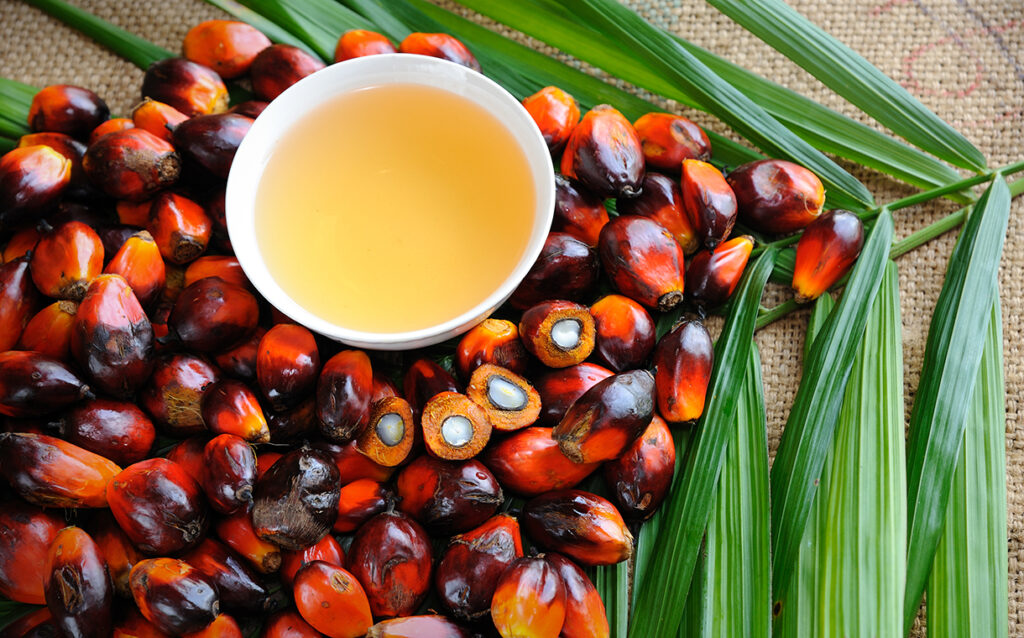When it comes to the ingredients used in the making of baby formulas palm oil is often used in some of the best baby formulas on the market. Unfortunately, palm oil is very popular for children’s food production mainly because it contains palmitic acid which is often found in breast milk but at the same time the molecular structure present in breast milk is structurally different from the one in palm oil.
The main reason why palm oil is used in infant formulas is to imitate the fatty acid present in human milk and achieve similar levels of palmitic acids.
When this structure gets into the intestines of the baby it normally links with calcium making it insoluble which is quite dangerous for the baby’s health because it could lead to the formation of colic and constipation.
As mentioned above manufacturing companies normally try to make up for the amount of calcium by increasing the calcium in formulas so that the baby is able to get all the calcium, they need to build strong bones.
Fun Fact: Studies have shown that prebiotics and probiotics are both beneficial for calcium uptake.
When it comes to premature babies’ calcium absorption is particularly important as they miss out on the last few weeks of gestation which is an important period in bone density growth. When choosing a formula choose or formula with other fat sources like formula such as HIPP Comfort that contains betta-palmitate which can easily be absorbed.
If your child is striving on a formula containing palm oil perfectly fine there is absolutely no need to switch, because researches have indicated the palm oil in your child’s formula would not adversely affect bone mineralization on a long run, it should certainly not deter you from confidently feeding your child with the formula of your choice. But we do recommend to keep a close eye on the composition in your child’s formula without palm oil ingredient in it just to be on the safe side.
At organicbestshop.com you can find baby formulas that are 100% palm oil free.
Why palm oil is not advised?

- Through researches it has shown then when vegetable oils like palm oils are refined, they release harmful levels of glycidyl fatty acids esters [GE] and 3 -monochloropropamidiol [3-MCPD]. Glycidyl fatty acid esters both genotoxic and carcinogenic. Genotoxic meaning that they could be harmful to the DNA of the child which could lead to gene mutations, while carcinogenic meaning it could lead to cancer. 3-MCPD could also cause kidney damage.
- Research has also shown that baby formulas with palm oil could also affect the amount of good and important fat or minerals being absorbed like calcium which like stated could lead to reduced bone density and mass.
- The purpose of baby formula is to mimic each component of breast milk which is the gold standard. Breast milk is made up of fat, protein and carbohydrates which gives the baby over half the amount of energy needed for healthy development. The lipid are essential fatty acids that aid tissue growth, cardiovascular health, bring development and function. They are the building block of life and essential for neurodevelopment in the child.
The difference between Palmitic Acid from Breast Milk vs Palmitic Acid from Palm Oil

Yes, it is true that both palm oil and breast milk are both sources of palmitic acid but they both have different configurations. The major difference is how these triglycerides are broken down by the infant strike digestive system. Most times palmitic acid found in palm oil is not as properly absorbed as well as the palmitic acid found in breast milk which would lead to the floating of the palmitic acid from the palm oil in the baby’s intestine where it ends up binding to calcium molecules forming calcium soaps. Due to the fact there is a presence of undigested calcium and palmitic acid from the palm oil in the digestive system they end up being removed from the body as part of the normal bowel movement.
Most times the majority of babies are able to digest a wide variant of fatty acids, including palmitic acid from palm oil without any problem. But sometimes there are babies with very sensitive digestive systems, including premature babies who could be prone to the formation of calcium soaps which can cause harder stools or lead to constipation. Due to such reasons it’s important to provide your baby with formulas which are gentle to digest such as HIPP Comfort Which contains fat blends with betta- palmitate, a triglyceride in which the palmitic acid is more absorbable and won’t inhibits calcium absorption or cause calcium soaps.
Other studies related to palm oil there is the realisation that not most concerns are about formulas for health effects but rather about the environmental impact because palm oil is produced using agricultural methods that are detrimental to our ecosystem and biodiversity. That is why companies such as HIPP and Holle maintainable -sources, socially -responsible organic palm oils that have grown without slashes and burning of agriculture or destruction of old forests. For more information, you can visit myorganiccompany.store.
All formulas contain palm oil

Palm oil in baby formula is commonly found in majority of baby formulas, but it is possible to find organic formulas without it. Holle formula recently removed palm oil from all its goat’s milk formulas instead it uses organic sunflower oil and organic rapeseed oil as fat sources in addition to full cream organic goat’s milk powder which are free of pesticides and are also environmentally friendly.
When it comes to formula feeding most times, we are focused on making sure it is edible for the child but most times the ingredients added to the formula is very important they could either help build or lead to healthy development of the child or they could damage on the long run. So, it’s important to make sure that the ingredients stated in the baby’s formula are organic safe for the child on a long run to prevent future complications or diseases especially when it comes to feeding for premature babies who are still not fully developed, they need the most attention when it comes to the formulas, they are giving apart from breast milk.















